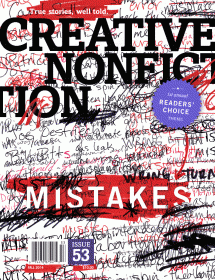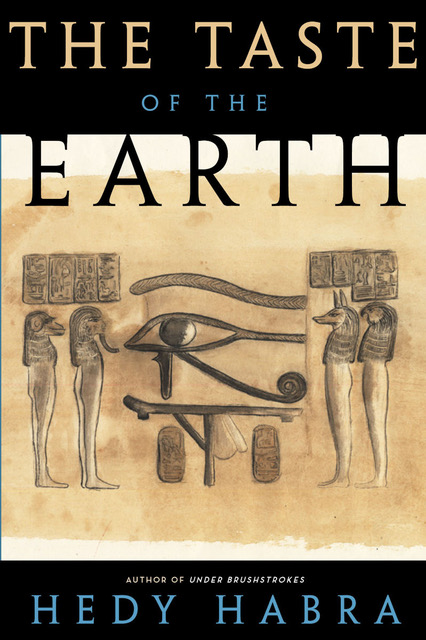 My subscription to Creative Nonfiction is new and this is the first issue I’ve read. I read essays from time to time, of course, but usually not so many all at once. I have to keep reminding myself that they aren’t short stories. Oh, yeah. This is real.
My subscription to Creative Nonfiction is new and this is the first issue I’ve read. I read essays from time to time, of course, but usually not so many all at once. I have to keep reminding myself that they aren’t short stories. Oh, yeah. This is real.
The theme for this issue is Mistakes, which is a great theme. I’ll only mention some of my favorites from the thematic part of the issue. The best, I think, is “Lessons” by Catherine Musemeche, an excerpt from her book. The author is a pediatric surgeon and in this piece she recalls learning from an experienced doctor about being extra careful, and how to deal with mistakes. But she also recalls her own mistake, or what may have been her mistake, one that she managed to catch during surgery before it had catastrophic results. Also interesting was “Still, Standing” (the comma placement being quite deliberate) by Ennis Smith, about the author’s foray into nude modeling during a period of unemployment. And then there’s the horrific piece, “Don’t Scream,” by Bill Pitts, about “extreme forms of protest in a prison work camp.” Yeah, I’d call 36 intentionally broken legs pretty extreme.
But I also enjoyed two pieces outside of the thematic section because they’re by friends of mine (who happen to be fine writers). First is “The Correctors” by Carol Fisher Saller. Carol is a copyeditor, and in this piece she notes wryly that sometimes copyeditors make mistakes, too. So she admonishes readers to be forgiving of the occasional typo in printed work. “A typo is a typo,” she says, “not a sign that the barbarians are at the gate.” (Oh, boy, I’m guilty of loud complaints about typos in books I’ve paid nearly $30 for, but I’ll try to let those go in the future. I’ll try, but I probably won’t succeed.) More importantly, she suggests educating yourself about the current state of things. After all, some of what we learned about punctuation has changed since we were in school (at least when I was in school). Good advice.
The second is something of an experimental piece by Scott Loring Sanders about his father. It’s called “My Father” and every paragraph begins with those two words. The effect is quite moving.
The last piece I’ll mention is “Platforms are Overrated” by Stephanie Bane. Although the author is a newly minted MFA, she has extensive experience with an ad agency and recently has worked in digital media. She says that the conventional wisdom that you have to have a platform is bullshit. (Her term, not mine.) What’s true about her argument is that social media and blogging isn’t as effective a tool to sell books as we’ve been led to believe, or maybe as used to be the case. The Catch 22 is that the publishing industry—agents and editors—hasn’t figured that out yet. So for most of us looking to land a book deal, the platform is still valuable. What happens after the book gets published is another story.
But even then, I’m not sure she’s right. I think of Rebecca Skloot’s The Immortal Life of Henrietta Lacks. Now, by all accounts, that’s a fine and important book. (I confess that I own it but have not yet read it.) But part of what made the book a bestseller is that Skloot prepared the ground for it by building the best platform ever. Here’s a discussion of her experience. The point is that platform building isn’t just about Facebook, Twitter, and a blog post now and then, and I’m not sure Bane gets that. So read this piece, but take it with a grain of salt. We all have to do what we can and what we can afford to get the word out about our work. For some of us, the tools are pretty limited.



Thanks for the kind mention of my piece on Rebecca Skloot!
-Dan
I’ve heard Skloot talk about her platform and pre-publication efforts, and was mightily impressed. Thanks for the great summary. I assume you don’t agree with Stephanie Bane that what we’ve heard about the need for a platform is “bullshit”?